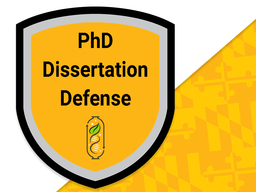PhD Dissertation Defense: Zahra Ghassemi
Location
Online
PhD Dissertation Defense: Zahra Ghassemi – Online Event
Date & Time
April 8, 2022, 3:00 pm – 4:00 pm
Description
Zahra Ghassemi, PhD Candidate
Advisor:
Protein confinement and effects on thermodynamic stability, aggregation, and enzymatic activity
Abstract:
Proteins are complex, vulnerable macromolecules susceptible to denaturation in biological and manufacturing processes. Nearly all proteins require their native structure to function properly. In vivo, proteins fold in environments composed of small molecules, macromolecules, and larger structures. The macromolecules in particular play unique roles influencing protein structure by presenting a 3D “confining” environment that limits protein mobility. However, most protein structure and aggregation studies are carried out in buffer solutions where proteins are "free" to diffuse. To mimic the in vivo scenario, crowding agents are added to the buffers; the term "crowded" refers to the presence of a high concentration of uncrosslinked macromolecules that exclude solvent volume available to proteins. These works have unveiled insights into protein structure during crowding; however, protein structure under confinement is yet poorly understood.
Herein, a novel means to controllably crowd and confine proteins is presented: macromolecules crosslinked are into a hydrogel, forming fixed barriers or a “mesh”, confining the proteins, while simultaneously excluding solution volume due to the macromolecules themselves. This dissertation reports protein confinement effects on thermodynamic stability, aggregation kinetics, and enzymatic activity. Model proteins were confined within homogeneously-crosslinked hydrophilic poly(ethylene) glycol (PEG) hydrogels. Primary findings include: i) when hydrogel mesh size is approximate to protein size, a protein subset has enhanced stability (i.e., aggregation of hydrophilic proteins is decelerated or prevented, yet aggregation of hydrophobic proteins is promoted); ii) enzymatic activity is better preserved in PEG hydrogels than free buffer; and iii) an insightful generalized model correlating mesh size, protein unfolding free energy, and protein size that is sensitive to the number of amino acid residues, stability, aspect ratio, and accessible surface area. This work provides a novel means to influence protein stability to solve complex problems related to disease and therapeutics development.
Agneda
WEBEX Information:
